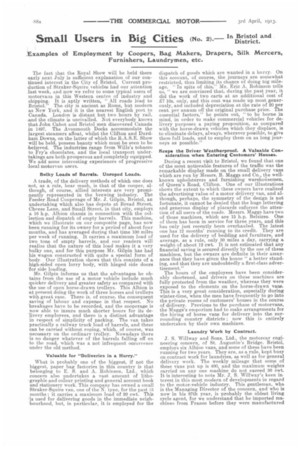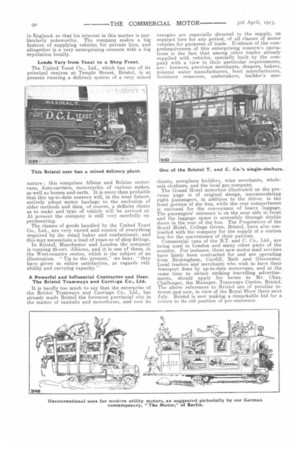Small Users in Big Cities (No. 2).
Page 6

Page 8

If you've noticed an error in this article please click here to report it so we can fix it.
In Bristol and District.
_Examples of Employment by Coopers, Bag Makers, Drapers, Silk Mercers, Furnishers, Laundrymen, etc.
The fact that the Royal Show will be held there early next July is sufficient explanation of our continued interest in the City of Bristol. Current production of Straker-Squire vehicles had our attention last week, and now we refer to some typical users of motorvaas in this Western centre of industry and shipping. It is aptly written, " All roads lead to Bristol." The city is ancient as Rome, but modern as New York, and it is the nearest English port to Canada. London is distant but two hours by rail, and the climate is unrivalled. Not everybody knows that John Cabot and Bristol men discovered Canada in 1497. The Avonmouth Docks accommodate the largest steamers afloat, whilst the Clifton and Thirdham Downs, on the latter of which the R.A.S.E. Show will be held, possess beauty which must be seen to be believed. The industries range from Wills's tobacco to Fry's chocolates, and the local transport undertakings are both prosperous and completely equipped. We add some interesting experiences of progressive local motorvan users.
Bulky Loads of Barrels. Unroped Loads.
A trade, of the delivery methods of which one does not, as a rule, hear much, is that of the cooper, although, of course, allied interests are very prominently represented in the brewing industry. The Feeder Road Cooperage of Mr. J. Gilpin, Bristol, an undertaking which also has depots at Bread Street, Cheese Lane, and Small Street, in that city, employs a 16 h.p. Albion chassis in connection with the collection and dispatch of empty barrels. This machine, which we illustrate on our composite page has now
been running for its owner for a period of page, four months, and has averaged during that time 100 miles per week of running. It carries a maximum load of two tone of empty barrels, and our readers will realize that the nature of this load makes it a very bulky one, and for this purpose Mr. Gilpin has had his wagon constructed with quite a special form of body. Our illustration shows that this consists of a, high-sided open lorry body, with hinged side doors for side loading.
Mr. Gilpin informs us that the advantages he obtains from the use of a motor vehicle include much quicker delivery and greater safety as compared with the use of open horse-drawn trolleys. This Albion is at present doing the work of three horses and trolleys with great ease. There is, of course, the consequent saving of labour and expense in that respect. No 'breakages have to be recorded, and the cooperage is now able to insure much shorter hours for its delivery employees, and there is a distinct advantage in respect of simplicity of packing. The van takes practically a railway truck load of barrels, and these can be carried without roping, which, of course, was necessary on the ordinary trolley. Nowadays there is no danger whatever of the barrels falling off on to the road, which was a not infrequent occurrence under the old method.
Valuable for "Deliveries in a Hurry."
What is probably one of the biggest, if not the biggest, paper bag factories in this country is that belonging to E. S. and A. Robinson, Ltd.. which concern also undertakes a vast amount of litho-graphic and colour printing and general account book and stationery work. This company has owned a small Straker-Squire van, one of the N. tyne, for the past Is months: it carries a maximum load of 20 cwt. This is used for delivering goods in the immediate neighbourhood, but, in particular, it is employed for the dispatch of goods which are wanted in a hurry. On this account, of course, the journeys are somewhat restricted, thus limiting its chance of doing big mileage. " In spite of this," Mr. Eric A. Robinson tells us, " we are convinced that, during the past year, it did the work of two carte at an additional cost of £7 10s. only, and this cost was made up most generously, and included depreciation at the rate of 20 per cent, per annum off the original purchase price. The essential factors," he points out, " to be borne in mind, in order to make commercial vehicles for delivery purposes a paying proposition, as compared with the horse-drawn vehicles which they displace, is to eliminate delays, always, wherever possible, to give them full loads, and to employ them on as long journeys as possible."
Keeps the Driver Weatherproof. A Valuable Consideration when Entering Customers' Houses.
During a recent visit to Bristol, we found that one of the most noticeable features of the traffic was the remarkable display made on the small delivery vans which are run by Messrs. B. Maggs and Co., the wellknown upholsterers and furnishing warehoilsemen, of Queen's Road, Clifton. One of our illustrations shows the extent to which these owners have realized the advertising value of a motor delivery van, and although, perhaps, the symmetry of the design is not fortunate, it cannot be denied that the huge lettering and generous display of placards enforces the attention of all users of the roads. Messrs. Maggs have two of these machines, which are 15 h.p. Belsizes. One of them has been in service for three years, and this has only just recently been overhauled. The latest one has 12 months' running to its credit. They are used for the delivery of bedding and furniture, and average, as a rule, only 30 miles a day, carrying a weight of about 12 cwt. It is not estimated that any financial saving is secured directly by the use of these machines, but the owners are definite in their assurance that they have given the house "a better standing, and that they are undoubtedly a. first-class advertisement."
The hours of the employees have been considerably shortened, and drivers on these machines are fully protected from the weather, whereas they were exposed to the elements on the horse-drawn vans. This is a very great consideration, especially during winter-time, when the men have frequently to go into the private rooms of customers' houses in the course of delivery. Previous to the purchase of motorvans, the Maggs's emporium had to make arrangements for the hiring of horse vans for delivery into the surrounding country districts ; now this is entirely undertaken by their own machines.
Laundry Work by Contract.
J. S. Willway and Sons, Ltd., the motorcar engineering concern, of St. Augustin's Bridge, Bristol, employs six Albion vans, and some of these have been running for two years. They are, as a rule, kept busy on contract work for laundries, as well as for general delivery work. The weekly mileage that some of these vans put up is 400, and the maximum weights carried on any one machine do not exceed 30 cwt. It is interesting to note Mr. J. S. Willway's keen interest in this most modern of developments in regard to the motor-vehicle industry. This gentleman, who is the Managing Director of the concern, and who is now in his 87th year, is probably the oldest living cycle agent, for we understand that he imported machines from France before they were manufactured
in England, so that his interest in this matter is particularly noteworthy. The company makes a big feature of supplying vehicles for private hire, and altogether is a very enterprising concern with a big reputation locally.
Loads Vary from Yeast to a Shop Front.
The United Yeast Co., Ltd., which has one of its principal centres at Temple Street, Bristol, is at present running a delivery system of a very mixed
nature ; this comprises Albion and Belsize motorvans, Auto-carriers, motorcycles of various makes, as well as horses and carts. It is more than probable that this up-to-date concern will, in the near future, entirely adopt motor haulage to the exclusion of older methods and then, of course, a definite choice as to make and type of vehicle will be arrived at. At present the company is still very carefully experimenting.
The classes of goods handled by the United Yeast Co., Ltd., are very varied and consist of everything required by the retail baker and confectioner, and this may necessitate a load of yeast or of shop fittings. . In Bristol, Manchester and London the company is running 25-cwt. Albions, and it is one of these, in the West-country centre, which is the subject of an illustration. " Up to the present," we hear, "they have given us entire satisfaction, as regards reliability and carrying capacity."
A Powerful and Influential Contractor and User. The Bristol Tramways and Carriage Co., Ltd.
It is hardly too much to say that the enterprise of the Bristol Tramways and Carria.ge Co., Ltd., has already made Bristol the foremost provincial city in the matter of taxicabs and motorbuses, and now its energies are especially directed to the supply, on contract hire for any period, of all classes of motor vehicles for purposes of trade. Evidence of the comprehensiveness of this enterprising concern's operations is the fact that among other trades already supplied with vehicles, specially built by the company with a view to their particular requirements, are : brewers, provision merchants, drapers, bakers, mineral water manufacturers, boot manufacturers, furniture removers, undertakers, builder's mer
chants, aeroplane builders, wine merchants, wholesale clothiers, and the local gas company. The Grand Hotel motorbus illustrated on the previous page is of original design, accommodating eight passengers, in addition to the driver, in the front portion of the bus, while the rear compartment is enclosed for the conveyance of heavy luggage. The passengers' entrance is on the near side in front and the luggage space is accessible through double doors in the rear of the bus. The Proprietors of the Royal Hotel, College Green, Bristol, have also contracted with the company for the supply of a station bus for the convenience of their patrons.
Commercial vans of the B.T. and C. Co., Ltd., are being used in London and many other parts of the country. For instance, three new motor mail services have lately been contracted for and are operating from Birmingham, Cardiff, Bath and Gloucester. Local traders and merchants who wish to have their transport done by up-to-date motorvans, and at the same time to obtain striking travelling advertisements, should apply for terms to Mr. Chas. Challenger, the Manager, Tramways Centre, Bristol_ The above references to Bristol are of peculiar interest just now, in view of the Royal Show there next. July. Bristol is now making a remarkable bid for a return to its old position of pre-eminence.






















